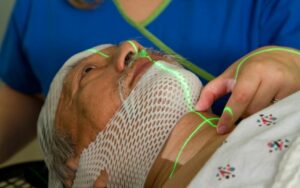Neck pain is a very common problem, and there can be many different things that cause the same. It can range from mild to debilitating and sometimes even turn into chronic pain that never goes away. It usually starts in one area of the neck. But, it may spread as well as cause other symptoms such as headaches. In this article, we will discuss signs and causes of neck pain, treatment options for neck pain, tips on how to alleviate neck pain at home, and finally prevention strategies for neck pain.
Contents
Understanding Neck Pain

Neck pain is a condition that a doctor characterizes by soreness, stiffness, and discomfort of the neck. Neck pain can occur as a result of an injury to the muscles or nerves in your cervical spine (the bones that make up your neck). Examples include whiplash from motor vehicle collisions, falls, and sports injuries. An injury to the structures of your neck, such as a herniated disc in the lower part of your spine can also cause neck pain. People often combine neck pain with headaches or other symptoms that affect nerves, muscles, and bones.
Causes of Neck Pain
The most common causes for Neck Pain are:

- Neck strain/sprain
- Neck arthritis
- Injuries (ute and chronic) in the neck
- Neck tumors
Other medical conditions such as arthritis, osteoporosis, or diabetes. Physical stressors like repeated strain from poor posture while at work, during sports activities, or driving for long periods of time can also cause neck pain. People usually combine neck pain with headaches or other symptoms that affect nerves, muscles, and bones.
Symptoms of Neck Pain
Symptoms may include:

- Neck stiffness
- Soreness in the neck
- Neck weakness
- Headaches
- Numbness in the arms
- Tingling sensations
- Neck cramps
- Hiccups
If you notice any new symptoms along with your neck pain, it is helpful to mention them when you see your doctor.
Complications of Neck Pain

Neck pain is a common health issue, with about two-thirds of the population experiencing some kind of issue in their lives. It can be caused by many factors including sports injuries or car accidents, but it most commonly arises from stress and poor posture over time. It usually arises on one side of your body at first before affecting both sides. Neck pain may also cause other health problems such as numbness and tingling, headaches, and jaw pain.
Neck pains can be completely debilitating to your daily life if you do not take any action towards treatment or prevention of the issue.
Diagnosis of Neck Pain
Doctors can treat the pain with chiropractic care, acupuncture, physical therapy, and a number of other therapies effectively. Neck pains can also arise from more serious injuries such as whiplash or degenerative disc disease so it is important to seek medical help if you experience any new symptoms. One should not take the issue lightly because the longer you live with neck pain, the more likely you are to develop permanent damage that will affect your quality of life long term.
Treatment options are readily available for those who take action quickly. Neck pains can cause other debilitating symptoms so it’s important to seek help if you experience any new or worsening symptoms.
Blood Tests

If your doctor suspects that you have a more serious injury than just neck pain, they might order some blood tests to check for potential diseases or conditions. Neck pains can be caused by Vitamin D deficiency so doctors may also ask you to take supplements if your levels are low. Blood tests include checking for anemia and thyroid disorders.
X-Rays

X-rays are another common way to determine the cause of neck pain. An x-ray can help your doctor see if there is any narrowing of the spinal canal that may be causing some pressure on the nerves in your spine, which could be contributing to your pain. Neck X-rays can also reveal bone spurs or arthritis around vertebrae. They can also help your doctor see if there are any arthritis or bone spurs that may be causing some pain in the neck. Neck x-rays are not as accurate as CT scans, but they can still give a good indication of what might be going on and whether further testing should take place.
CT Scan

CT scans are a more definitive means of diagnosing the cause of neck pain. They provide higher resolution than x-rays and can give your doctor an even better idea about what is causing some issues in your spine or neck that may be leading to symptoms such as numbness, tingling, headache, etc. Neck CTs will help doctors see if there is a herniated disc that may be putting pressure on the nerve in your spine. Neck CTs can also help doctors see if you have arthritis or degenerative changes in the discs of your neck, which could contribute to pain and other symptoms.
MRI Scan

MRI scans are another option to look at the cause of neck pain. MRIs will provide even higher resolution than CTs and can give your doctor a better idea about what is causing some issue in your spinal cord that may be leading to symptoms such as numbness, tingling, headache, etc. Neck MRIs can also help doctors see if you have any herniated discs that may be putting pressure on the nerve in your spine. Neck MRIs can also help doctors see which specific disc is causing some issue and where it is located so they know what kind of treatment options will work best for you.
Treatment Methods

Neck discomfort can typically be treated in several ways, depending on what has caused it and how long the pain has persisted. Neck pain is one of the most common types of musculoskeletal ailments that affect people worldwide.
Nerve Blocks
A local anesthetic called a nerve block can be injected into the area surrounding a nerve to see if that will provide some relief of symptoms and decrease pain. Neck blocks are usually only used when other types of treatment have failed.
Epidural Injections
Epidural injections are another option for those who live with chronic neck pains but do not want surgery or cannot undergo surgery. An epidural injection is a steroidal medication injected into the spine to decrease inflammation and help treat pain that arises from issues such as arthritis or degenerative disc disease. Neck injections are usually only used on patients who have tried other treatments first without any success.
Pulsed Radiofrequency
Pulsed radiofrequency is a minimally invasive treatment that can be used to treat chronic neck pain. Neck Pulsed Radiofrequency sends electrical currents through the skin into underlying tissues. It heats up there and destroys some of those cells, resulting in less inflammation (swelling) and less nerve irritation.
Spinal Cord Stimulation
Spinal cord stimulation, also known as neurostimulation, is a treatment for chronic pain that can be used on patients who suffer from both acute and chronic neck pains. Neck spinal cord stimulation sends electrical currents through the skin into underlying tissues to decrease inflammation (swelling) and nerve irritation.
Orthotic devices like cervical pillows or braces help Neck braces or pillows help the patients maintain their necks in a straight and upright position. This allows the muscles to relax, which decreases nerve pressure and thus eases pain.
Surgery
If all else fails, surgery may be an option for those who live with chronic neck pains that inhibit daily living activities like work or sleep. Neck surgery can be used to correct bone and ligament issues, such as fractures or herniated discs.
Physical Therapy
Physical therapy is also a common treatment option for those who suffer from neck pain that manifests itself in the weakness of the arms, legs, and hands due to nerve damage. Neck physical therapy helps patients regain strength and function through the neck.
Exercise
Exercise can be used to strengthen the neck and help prevent future injuries. Exercises that focus on strengthening muscles of the back, shoulders, legs, arms, and buttocks are often beneficial for those who live with chronic pain from a weak or injured spine.
Yoga
Yoga is another good option for those who suffer from neck pain, especially when other treatment options have failed. It helps strengthen the muscles in the upper back and shoulders that support the neck, allowing it to relax. This allows blood flow to return properly which decreases muscle tension and neck.
Chiropractic Care
Chiropractors can also offer relief for those who live with chronic neck pain that inhibits daily living activities. Neck chiropractic treatment helps realign the spine and relieve pressure on key muscles, which decreases nerve irritation and thus eases the condition of the neck.
Home Remedies to Treat The Pain

Neck pain can be debilitating. But, fortunately, there are many things you can do at home to help relieve your symptoms. The pain is common, with 70-90% of people experiencing some type of neck problem in their lifetime. Neck pain can also be caused by the use of poor-quality pillows or mattress toppers.
If you are experiencing neck pain, here is a list of treatments at home. The following remedies have been shown to help reduce your symptoms:
- Ice application
- Massage therapy
- Use acupuncture to stimulate nerve endings
- Use a heating pad
- Take over-the-counter pain medications such as ibuprofen or acetaminophen. These can be very effective in reducing your symptoms quickly. Discuss with your doctor before taking any medication if you are pregnant, breastfeeding, have liver disease, stomach ulcers, or kidney disease.
- Use moist heat packs to relax muscles and reduce pain.
- Use a neck pillow when you sleep at night
- Stop doing activities that cause your symptoms to get worse. Examples include playing sports or working on the computer for prolonged periods of time
- Perform gentle stretching exercises regularly
These are all the treatments that you can use to treat the pain without the assistance of a doctor or a physical therapist.
Prevention Of Neck Pain
Here are a few things that a person must keep in mind if he/she wants to prevent himself/herself from neck pain.
- When participating in physical activity, maintain a healthy posture.
- While working, take regular breaks.
- Make sure your monitor is at eye level by adjusting your desk, chair, and computer.
- When talking, avoid tucking the phone between your ear and shoulder.
- Quit smoking if you’re a smoker.
- Carry large bags with straps over your shoulder as little as possible.
- Sleep in a comfortable position.
Conclusion
People who suffer from chronic pain often need to consult a doctor for a custom orthotic. Custom orthotics can help reduce pressure on the facet joints and spinal nerves. It helps alleviate some of the symptoms that come with long-term chronic pain in various parts of the body. To learn more about how you might benefit from an effective treatment like this, reach out to our team today! We’re happy to answer any questions and provide further information so you know what’s best for your unique needs.
Physical Therapy help patients recover from pain. If you’re experiencing Back pain, Shoulder pain, Knee pain, Neck pain, Elbow pain, Hip pain or Arthritis pain, physical therapist at MantraCare can help: Book a physio therapy session.


